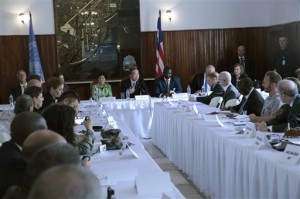Sierra Leone bans Christmas parties amid Ebola

U.N. Secretary-General Ban Ki-moon, center right, meets with Ebola response partners, at Monrovia City Hall, in Monrovia, Liberia on Friday, Dec. 19, 2014. Ban praised health workers battling Ebola in Sierra Leone and Liberia on Friday, saying they have shown “the most noble face of humankind” amid an epidemic that has killed more than 6,900 people in West Africa. Ban, who made stops in both countries on Friday, travels Saturday to Guinea where the Ebola virus first emerged a year ago. (AP Photo/United Nations, Evan Schneider)
FREETOWN, Sierra Leone — Alice Marke and her family aren’t celebrating Christmas the way they used to: The deadly Ebola epidemic in Sierra Leone means no festive parties at the beach, no carolers singing at night.
“We will stay at home glued to our radio and television sets for broadcast of Christian services and prayers for the country, especially for the speedy end to the deadly Ebola disease early in the New Year,” Marke says.
Faith is important in this country with a sizeable Christian population still recovering from a brutal civil war that ended more than a decade ago. It’s not uncommon to see Biblical verses painted on public transport buses.
Now Ebola is spreading fastest in Sierra Leone’s Western Area, which includes the capital of Freetown. It’s believed that more than half of all new cases come from this part of the country, and authorities fear those infected but not yet symptomatic could unwittingly spread it to other parts of the country if people travel to their rural hometowns as is common over the Christmas holidays.
So the government is restricting travel between districts during the holidays. People will be allowed to attend church on Christmas Day, but “are requested to return home immediately after church services,” President Ernest Bai Koroma has said.
Article continues after this advertisementPublic gatherings at restaurants, nightclubs and beaches are banned. And markets are being asked to cut back their hours, reducing the amount of time people have to buy Christmas presents.
Article continues after this advertisement“I know that this is the festive season where Sierra Leoneans often celebrate with families in a flamboyant and joyous manner, but all must be reminded that our country is at war with a vicious enemy that is still taking the lives of our brothers, sisters, mothers, fathers, children and friends,” Koroma said recently.
The president said the state of emergency was still in place, adding “that my government will implement its measures to the letter during this festive season.”
The Christmas holiday is less of an issue in predominantly Muslim Guinea.
Festivities are being celebrated more freely in neighboring Liberia, where the number of Ebola cases has been dropping. Families are busily shopping for Christmas gifts at markets in the capital of Monrovia, a city of 1.5 million people, despite orders to avoid mass gatherings.
Some roads have been completely taken over by multitudes of people shopping, rubbing against one another and interacting as if Ebola is no longer here.
“If somebody is sick, we advise them to remain home and take care; that person shouldn’t go to market areas,” said Health Minister Tolbert Nyenswah , who heads Liberia’s Ebola response. “And people should go about their normal business as usual but then be careful … because the disease is here and there is no room for complacency,”